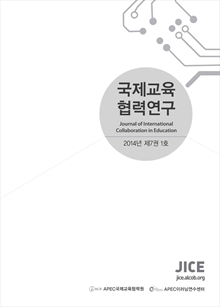간행물
국제교육협력연구지 Journal of International Collaboration in Education

- 발행기관 APEC국제교육협력원
- 자료유형 학술지
- 간기 반년간
- ISSN 2005-1190 (Print)2288-6389 (Online)
- 수록기간 2008 ~ 2014
- 주제분류 사회과학 > 교육학 사회과학 분류의 다른 간행물
- 십진분류KDC 371DDC 379
권호리스트/논문검색
제4권 제1호 (2011년 6월) 4건
1.
2011.06
구독 인증기관 무료, 개인회원 유료
(The) Basic Reseach for Improvement of Education for International Understanding of Elementary Schoo
국제이해교육은 직접적인 체험과 사람과의 교류를 통해 공감하는 마음을 갖는 지구촌 가족, 나와 세계인이 연결되어 있음을 인식하고 공동의 과제를 함께 해결하면서 더불어살아가고자 노력하는 국제인을 지향하는 교육이다. 최근 세계화와 함께 지구촌의 심리적거리는 매우 좁아지고 있으며 이처럼 변화하는 현실적 요구에 맞추어 초등학교 시기부터국제이해교육의 필요성이 부각되고 있다.본 연구는 서울, 부산, 광주의 초등학생과 교사를 대상으로 한 설문지를 통해 국제이해교육의 실태와 요구를 조사하고 분석하였다. 설문지를 분석한 결과 국제이해교육의 본질에대한 인식보다는 교과교육과정의 내용을 답습하는 형태의 수업이 이루어지고 있었다. 대도시를 중심으로 교사와 학생의 해외 체험의 횟수가 증가하고 있으나 국제이해교육의 태도에대한 측면은 지역별, 교사의 교직경력별, 교사의 해외경험에 따라 큰 차이를 보인다.
6,700원
2.
2011.06
구독 인증기관 무료, 개인회원 유료
한국은 ICT 활용교육 및 e-러닝 분야에서 개발도상국의 계속적인 관심을 받고있고, 이 분야와 관련하여 국제 사회로부터 적극적인 ODA(Official DevelopmentAssistance, 공적 개발 원조) 참여를 요구받고 있다. 이에 따라 한국의 학자들과연구 기관에서는 ODA에 관한 연구를 진행하여 개선방향을 제시하였다.본 연구는 국제학 및 국제교육협력 분야의 한국 전문가들의 연구보고서들을 분석하여 현재 한국 ODA의 제한점을 다음과 같이 도출하였다: 1) 수혜국에 대한요구분석 미흡, 2) 프로젝트 수행과정의 불명확성, 3) 원조국 및 수혜국의 전문가부족, 4) 프로젝트 수행 후 평가 및 관리 미흡, 5) 지속적인 프로젝트 발굴 결여로 나타났다. 각 제한점에 대해, 한국의 ODA를 개선하기 위한 원리들을 연결하여제시하였다: 1) 교육 분야에 초점을 맞춘다, 2) 컨설팅 과정 모형을 개발한다, 3)사업타당성 연구를 시행한다, 4) 프로젝트 관리체제를 구축한다, 5) ODA 프로젝트 보고서를 저장․관리한다.이러한 일반적인 원리들을 기반으로, ICT활용교육 분야에 초점을 맞춘 국제협력의 이슈를 다음과 같이 제안하였다: 1) 지속가능한 경제성장을 위해서는 인적자원개발에 더욱 집중해야 한다, 2) e-러닝을 통하여 보다 많은 세계의 사람들과조화롭게 살아갈 방법들을 고려해야 한다, 3) 온라인 커뮤니티를 활용하여 보다많은 사람들이 미래교육을 위한 비전을 구성하고 공유해야 한다.
4,300원
3.
2011.06
구독 인증기관 무료, 개인회원 유료
e-Learning has now been used widely as a teaching tool of the new era. Effective delivery of e-Learning could bring a better learning outcome in an effective and efficient way. Besides, mobile technology has enabled mobility in e-Learning, which could bring even a better e-Learning for all. However, there is not yet a model of best practice in e-Learning for Thailand, let alone for the world. This paper discusses most selected modes out of 22 modes of Integrative Delivery Methodology with Mobility for successful implementation of e-Learning in Thailand based on perceptions and experiences of the lecturers from Thailand Cyber University Project, the only national e-Learning institution at Higher Education level under the Ministry of Education. The findings revealed that Discussion group is the most selected delivering mode followed by Forum and Brainstorming(equally).
5,200원
4.
2011.06
구독 인증기관 무료, 개인회원 유료
In the global knowledge economy society, the quality of human resource is the key for competition. Adults are the mainstream of workforce and therefore adult learning has been a crucial investment for economic targets. Due to the characteristic, adult learning is offered by diverse stakeholders and how to improve the partnership between providers has been a significant issue. The paper is based on an empirical study in Chinese Taipei’s local communities and there are meaningful results explored into 311 subjects in six different local communities. The findings are intended to apply in APEC member countries and recommendations are raised to develop educational partnership and networking for competing in global knowledge economy society.
4,000원

